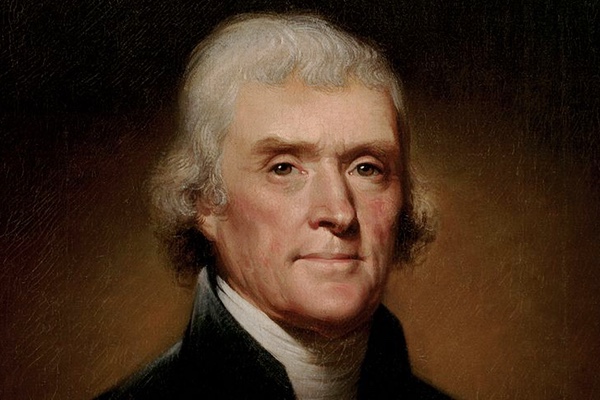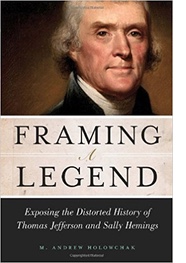Thomas Jefferson’s Failed Investment in Popular Democracy Is Why We Remember Him

There is consensus among scholars that Jefferson was a relatively unflinching optimist, whose faith in the eventual success in government of and for the people never wavered. Gordon Wood in “Thomas Jefferson in His Time,” typifies that sentiment. “No one of the Framing a Legend: Exposing the Distorted History of Thomas Jefferson and Sally Hemingsrevolutionary leaders believed more strongly in progress and in the capacity of the American people for self-government than did Jefferson. And no one was more convinced that the Enlightenment was on the march against the forces of medieval barbarism and darkness, of religious superstition and enthusiasm.” Such was his faith in progress and the people that he was unready for the ensuing revolution. “He had always invested so much more of himself intellectually and emotionally in the future and in popular democracy than Madison had. Jefferson was inspired by a vision of how things could and should be. Madison tended to accept things as they were. … Jefferson had nothing but the people and the future to fall back on; they were really all he ever believed in. That is why we remember Jefferson, and not Madison.”
 Prima facie,
it is an extraordinary claim: We prefer and remember Jefferson, not
Madison, because of the former’s naïveté!
Prima facie,
it is an extraordinary claim: We prefer and remember Jefferson, not
Madison, because of the former’s naïveté!
There is, however, more to the argument than naïveté. There is Jefferson’s faith that the future will not be like the past and his faith in the people.
Jefferson was not naïve to believe that the future will not be like the past. Even the staunchest conservatives acknowledge that. Yet Jefferson believed that the future would not be like the past because the future would be better than the past. Future generations would have a better grasp of how things work—nature being one of the things—and they would have technological advances to ease the burdens of everyday life. Future generations would put their moral sense to more efficient use, militate against opportunities for war, and look to Jesus as a moral cynosure. Future generations, most importantly, would reap the benefits of republican governing—government of and for the people; government with fullest participation by each citizen; government by the most capable, most intelligent, and most virtuous citizens, serving in fixed terms, as primus inter pares, with the primary aim of securing the rights of the citizenry, and elected and, if necessary, recallable by the people; and government neatly aligned with the science of its day. Jefferson, like many others of his time—e.g., Condorcet, Mercier, Rush, and Priestley—was a progressivist, and republican government, Jefferson believed, was an advance over the stale (usually mixed) systems of the past. Jefferson writes to A. Koraїs (31 Oct. 1823): “The government of Athens … was that of the people of one city making laws for the whole country subjected to them. That of Lacedaemon was the rule of military monks over the laboring class of the people, reduced to abject slavery. These are not the doctrines of the present age. The equal rights of man, and the happiness of every individual, are now acknowledged to be the only legitimate objects of government.”
Yet Jefferson was clear that republican government, built on the notions of the freedom and of the equality of all men, was an experiment of sorts that had never been given full application. “No experiment can be more interesting than that we are now trying,” writes Jefferson to John Tyler, “and which we trust will end in establishing the fact, that man may be governed by reason and truth.” Use of “experiment”—and Jefferson often uses the term—shows Jefferson has doubts, if only small doubts, concerning the effectiveness of popular democracy. He often argues for popular democracy through eliminative reasoning. There are two legitimate forms of government—government of a few or government of the many—and the former has been tried over millennia, with results disastrous for the people. Thus, government of the many must be given a try.
Republican governing, as popular democracy, entailed trust in the people, and here, from the distance of a couple of centuries—we can appeal to the fickleness of popular opinion in the last few decades in the “popular” election of our president—might claim Jefferson was singularly naïve in at least three senses. First, why did Jefferson think that the people were qualified to pick out and oversee their political leaders? Second, and following the animadversions of both Adams and Hamilton, what reason did Jefferson have for believing that the people best knew what was in their own best interest? Finally, why did Jefferson think the libertarianism that his notion of republicanism entailed would lead to contented, even happy, citizens?
Jefferson had ready answers to those questions.
All persons were roughly equally endowed with a moral sense, in no need of schooling but in need of prompting, which enabled them to sense both moral goodness and moral obliquity. Moreover, given a modicum of education—i.e., instruction in reading, writing, and basic math—citizens would be enabled to conduct wisely their own affairs and participate in the process of governing, insofar as their time and talents would allow. Thus, sound moral sensibility and a basic education would enable them to elect and oversee politicians and to participate in local politics.
Also, the experiment of government, determining collectively the good of each citizen, has been tried and it has miserably failed. In addition, starting from the axioms, stated eloquently in the Declaration of Independence, that people are fundamentally free and equal (equal in terms of morality and worthiness of rights), who else can determine for any citizen his own good but that citizen? Thus, aristocracies, especially hereditary aristocracies, are by fiat eliminated.
The last difficulty is more pressing. Jefferson never foresaw the rise of consumer capitalism, given lack of governmental intervention in citizens’ affairs. He merely assumed, or hoped, that there would be contagion to his anti-city sentiments and that most citizens would choose a simple agrarian manner of living and that the rest of the citizens would engage in only that amount of manufacture to keep America self-sufficient. He seldom gave due attention to human greed.
Jefferson, especially late in life, saw glitches, retrogradations. They were, he hoped, symptomatic of local, perhaps even temporary global, depravity. He elaborates in a letter to Benjamin Rush (22 Sept. 1809):
the interest I have taken in the success of the experiment, whether a government can be contrived which shall secure man in his rightful liberties & acquirements, has engaged a longer portion of my life than I had ever proposed: & certainly the experiment could never have fallen into more inauspicious times, when nations have openly renounced all the obligations of morality, and shamelessly assumed the character of robbers & pyrates. … if it can pass safely through the ordeal of the present trial, we may hope we have set an example which will not be without consequences favorable to human happiness.
Jefferson writes of enduring the harsh times and then hoping that the “pendulum will vibrate the more strongly in the opposite direction,” so “nations will return to the reestablishment of moral law with an enthusiasm which shall more solidly confirm it’s future empire.”
Jefferson’s naïveté has been amply underscored in the secondary literature. I offer some examples.
In The Presidency of Thomas Jefferson, Forrest McDonald says Jefferson’s political vision was oversimple, as it failed to accommodate human foibles. His political philosophy—with its eschewal of bribery, patronage, corruption and coercion—had this flaw: It could be instantiated “only with a Thomas Jefferson at the helm.”
Morton Frisch, in “Jeffersonianism and the New Deal,” asserts that Jeffersonian republicanism was a failed policy, because the political philosophy was unduly atomistic. “The essential failure of Jeffersonian liberalism as it projected itself through the nineteenth century and into the twentieth consisted in a one-sided and oversimplified concentration on individualism and all that this implies for politics and government.”
William Howard Adams, in The Paris Years of Thomas Jefferson, writes, “A humane society that would somehow reconcile the needs of an active, industrious, virtuous people with a simple yet satisfying agricultural order was a fleeting, abstract goal.” “By its very structure, the republic of isolated yeomen farmers that he was promoting on the frontiers of America made it impossible to form the critical intellectual and creative mass that a prosperous, progressive society ultimately required.”
In “Jefferson and American Foreign Policy,” Walter LaFeber states that Jefferson’s “early belief in the virtues of, and need for, agrarian expansionism” is what led to actions inconsistent with Jeffersonian republicanism—e.g., military action and a strong presidency—in order to protect agrarian and national interests.
Of course, it is always facile to judge the demerits of a political philosophy and to criticize the person entertaining it from the high perch of the future. Our America is not Jefferson’s brainchild. Hypocrisy, mendacity, hyperbole, and broken promises are political norms, when Jefferson asked us to expect virtue, intelligence, and talent.
Jefferson did have certain Cimmerian moments—e.g., Query XVII of Notes on the State of Virginia, where he writes of Americans, years after the American Revolution: “From the conclusion of this war we shall be going down hill. It will not then be necessary to resort every moment to the people for support. They will be forgotten therefore, and their rights disregarded. They will forget themselves, but in the sole faculty of making money, and will never think of uniting to effect a due respect for their rights.”
Yet such moments were infrequent, atypical. Jefferson was an incurable optimist and had a firm belief in the peoples’ ability to govern themselves through elected representatives. The role of elected representatives was for Jefferson representational—that is, to represent rightfully the will of the majority, so long as that will was reasonable. He could never envision a time like ours, when our representatives—firmly ensconced into two parties, each massively hostile to the other—would mostly turn a blind eye to the will of the majority. He could never envision a time like ours, when special-interest groups would dictate political policies, independently of the will of the majority.
Jefferson was naïve. As Wood notes, he never lost his faith in the future and the people. That is why we still love Jefferson, why we shall never forget Jefferson, whatever foibles he may have had as a man.